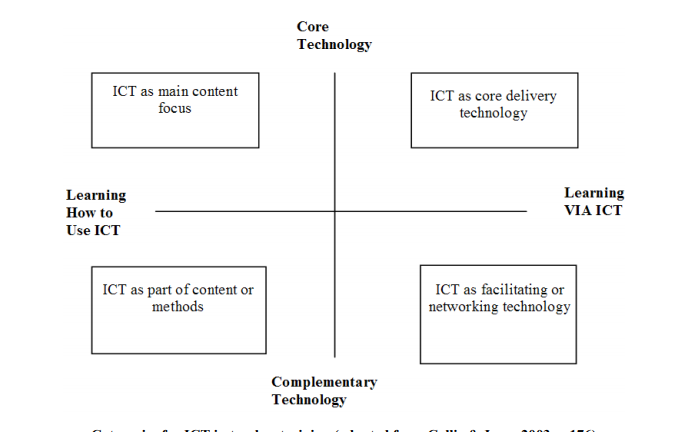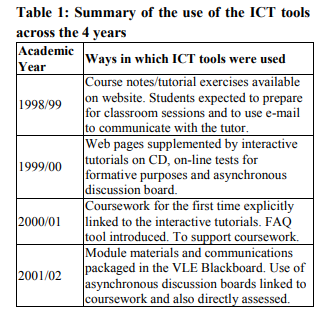IJCRR - 5(6), March, 2013
Pages: 127-132
Date of Publication: 30-Mar-2013
Print Article
Download XML Download PDF
ENTAIL OF THE INFORMATION AND COMMUNICATION TECHNOLOGY IN EDUCATION
Author: Kamlesh Kumar Dhiwar, Ashish Rastogi
Category: Technology
Abstract:The basic objective of this paper is to describe various use / application of ICT (Information and Communication Technology) in education whereby relevant professionals / new comers can efficiently use the ICT / tools according to their suitability and availability. During the preparation of this paper we studied some literatures and also discussed to some educational professionals about the use / role of ICT (Information and Communication Technology) in education area. Finally in this study we get various advantages of ICT in education field. It has also some drawback.
Keywords: ICT, educational professionals
Full Text:
INTRODUCTION
The student population in higher education is changing. The dynamic state of technological development has made perpetual (or lifelong) learning a necessity. For this reason, more and more adults are returning to school to learn new skills or expand the skills they already have. According to a recent article in The New York Times, the increasing number of adults returning to school is the result of "demands on companies, in an intensely competitive global economy, to keep improving productivity." Everhart believes that this dramatic increase in the student population may force most educational institutions to deliver at least half of all instruction online. Offering traditional on-campus courses to a burgeoning student population would require doubling the number of campuses, classrooms, and professors. This would lead to excessive costs and a critical shortage of instructional personnel. Further Chambers insists that properly designed and implemented online courses "provide faster learning, at lower costs, with more accountability, thereby enabling both companies and schools to keep up with [rapid] changes in the global economy." Both Everhart and Chambers agree that educational institutions cannot ignore the move to online instruction if they hope to attract and keep students in the future. ICT experts and educationist expects that in the future all classrooms will have multimedia delivery access available to allow students and instructors’ access to the Internet. This access will make it possible for the virtual and physical classrooms to mesh to create an alternative course format of "connected learning" that will combine the best of both worlds. The changing modes of instructional delivery will demand that courses be designed to provide for greater student-student and student-teacher interactivity. As more and more courses move from the physical F2F classroom to the "connected" or virtual classroom, students will need to assume more responsibility for their own learning. They will need to become independent learners, able to think and figure things out for themselves

According to research reports half of the students believed that information technology improved the courses that they were taking while most preferred a ‘moderate’ level of IT usage in their courses. There appeared here possibly to be a concern about ‘excessive’ use of information technology, though the study did not explore this area further. The use of information technology by students in their daily lives is increasing and while many instructors are using IT effectively in their courses, it appears that many are not, revealing significant opportunity for improvement.
Categorisation of information technology tools for education: The information technology based tools that can be used for education are expanding daily. The following chart illustrates the technologies available:
ICT: changes the continuing training: Recently the role of higher education institutions in the area of training of employees is limited. The increasing use of ICT could mean a change in this respect. The potential changes because of ICT depend on the extent to which:
- ICT (is)/(will be) used as a training tool for training of employees. If the role of ICT is limited, than expected changes in the structure of the market because of this will be limited;
- ICT as a training tool can be considered as additional training in the sense that ICT helps to organise training in situations where otherwise no training would have taken place. Points 1 and 2 together determine to what extent the market of training of employees grows as a whole because of the use of ICT as a training tool.
- The use of ICT could improve the relative position of higher education institutions in this market. The potential changes for higher education institutions because of ICT will be higher, the more important this training tool turns out to be, the more this will lead to additional training and the more this will change their market position compared to other suppliers.
The importance of ICT as a training tool
In the Netherlands NIDAP organises a yearly survey on continuing training among approximately 800 companies with at least 50 employees. For the survey over 1999, we made use of the possibility to add a number of questions to this survey about their use of ICTbased training. The outcomes of the survey lead to the following estimates for the quantitative use of ICT-based training of the employed.

Benefits/Advantages of ICT in Education:
Here are some of the benefits which ICT brings to education according to recent research findings.
Greater efficiency throughout the school.
- Communication channels are increased through email, discussion groups and chat rooms
- Regular use of ICT across different curriculum subjects can have a beneficial motivational influence on students’ learning.
- ICT facilitates sharing of resources, expertise and advice
- Greater flexibility in when and where tasks are carried out
- Gains in ICT literacy skills, confidence and enthusiasm.
- Easier planning and preparation of lessons and designing materials
- Access to up-to-date pupil and school data, anytime and anywhere.
Enhancement of professional image projected to colleagues.
Students are generally more ‘on task’ and express more positive feelings when they use computers than when they are given other tasks to do.
? Computer use during lessons motivated students to continue using learning outside school hours.
Benefits for students
- Higher quality lessons through greater collaboration between teachers in planning and preparing resources.
- More focused teaching, tailored to students’ strengths and weaknesses, through better analysis of attainment data
- Improved pastoral care and behaviour management through better tracking of students
- Gains in understanding and analytical skills, including improvements in reading comprehension.
- Development of writing skills (including spelling, grammar, punctuation, editing and re-drafting), also fluency, originality and elaboration.
- Encouragement of independent and active learning, and self-responsibility for learning.
- Flexibility of ‘anytime, anywhere’ access
- Development of higher level learning styles.
- Students who used educational technology in school felt more successful in school, were more motivated to learn and have increased self-confidence and self-esteem
- Students found learning in a technologyenhanced setting more stimulating and student-centred than in a traditional classroom
- Broadband technology supports the reliable and uninterrupted downloading of webhosted educational multimedia resources
- Opportunities to address their work to an external audience
- Opportunities to collaborate on assignments with people outside or inside school Benefits for parents
- Easier communication with teachers
- Higher quality student reports – more legible, more detailed, better presented
- Greater access to more accurate attendance and attainment information
- Increased involvement in education for parents and, in some cases, improved selfesteem
- Increased knowledge of children’s learning and capabilities, owing to increase in learning activity being situated in the home
- Parents are more likely to be engaged in the school community
Disadvantages of ICT
One of the major barriers for the cause of ICT not reaching its full potential in the foundation stage is that schools are facing the cost of the technology. As everyone knows, computers are not cheap and even after purchasing, ICT items will at some point, require maintenance to keep them running, which may again prove costly. Some see it as a potential tool to aid learning whereas others seem to disagree with the use of technology in early year settings. It’s also important that use of this technology is constantly monitored by teaching staff to ensure it is being used correctly. Some people may have the opinion that the teachers who had not experienced ICT throughout their learning tend to have a negative attitude towards it, as they may lack the training in that area of the curriculum. A further disadvantage of ICT in the classroom is the issue of reliability. As those who use technology on a regular basis know, it is not uncommon for something to fail, meaning it is then unable to perform the task you expected it to. It’s important that the teacher addresses this when planning a lesson and have a backup plan if this is the case. It is also hard for teachers to use due to lack of experience using ICT tools.
RECOMMENDATIONS
- The teachers should increase the use of ICT for content transaction, preparation of the teaching-learning materials, academic planning, project work and making presentations as these are the components directly related to the teaching-learning process, rather than using it for maintaining records, examination purpose and downloading information. For the fulfillment of this objective, training programmes need to be conducted on a large scale.
- The management should encourage and support the schools to develop language laboratory and use it for the teaching of languages.
- The management should motivate teachers to use ICT for the teaching-learning process by providing the incentives and framing the policies at the institute.
- Govt. and other ICT companies should collaborate with Teacher Education colleges to provide training to in- ervice teachers for using ICT in teaching-learning process.
- Number of teachers attending workshops and seminars on “the Use of ICT in the teachinglearning process” should increase. Individual and institutions should utilize such opportunities to the maximum.
- Schools should prepare a schedule for a regular access to computers by students for preparing projects and assignments.
- Teachers should not restrict their knowledge and expertise of using computers for their own professional growth and development but should plan out activities for contributing to the growth and development of the institution.
-
References:
1. Gracia-Beltran, R. Martinez (2002). The Role of Self- Assessment in Aulaweb E-learning System. EDEN Annual conference proceedings.
2. Taylor J.C. (1999), “Distance Education: the Fifth Generation”, Proceedings of 19th ICDE World Conference on Open Learning and Distance Education, Vienna-Austria.
3. French, F (2001). Online Learning Resources – the students’ perspective, BITE 2001 Proceedings, Netherlands
4. Impact of Information Systems on Society http://impactofinformationsystemsonsociety. wordpress.com/2011/03/09/week-10- information-technology-and-education/
5. Kerr, J (ed)(2000). Online Information 2000, Proceedings, Learned Information Europe, London.
6. The Effects of Information Technology on Education, eHow.com http://www.ehow.com/about_6524477_effect s-information-technologyeducation.html#ixzz2Etp02jjr
7. Mizoguchi, R. (2000). IT revolution in learning technology, Proceedings of SchoolNet, Pusan, Korea, August 4-5, 2000.
8. Hezemans, M. and M. Ritzen (2002) Learning environments and responsibility. In: Proceedings of the TelE-learning Stream of IFIP Congress 2002. Norwell, MA: Kluwer Academic Publishers.
9. The Role of Information Technology in Education http://www.hitachifoundation.org/ourwork/business-and-work-grantsprogram/initiatives/past-initiatives/24-therole-of-information-technology-in-education
10. Daalen, C.E. van (2001). A case study comparing student appreciation of lectures to computer assisted instruction on the topic of systems modelling, In I. GIBSON (ed.), Proceedings SEFI seminar on Information and Communication Technologies inEngineering Education, 2-4 May, Galway, Ireland,
11. Soloway, E. et al. (1996). Learning theories in Practice: case Studies of Learned-Centered Design. Computer-Human Interaction. CHI'96. Electronic proceedings. http://info.acm.org/sigchi/chi96/proceedings/ papers/Soloway/ es-txt.htm
12. Lütticke, R., Carsten, C., Helbig, H.: VILAB - A Virtual Electronic Laboratory for Applied Computer Science, Proceedings of the Conference Networked Learning in a Global Environment, ICSC Academic Press, Canada/Netherlands 2002
13. ICT Advantages and Disadvantages http://ictadv-disadv.blogspot.in/
14. The Benefits And Drawbacks Of Ict In Education, http://phs-ict-as.wikidot.com/thebenefits-and-drawbacks-of-ict-in-education
|






 This work is licensed under a Creative Commons Attribution-NonCommercial 4.0 International License
This work is licensed under a Creative Commons Attribution-NonCommercial 4.0 International License